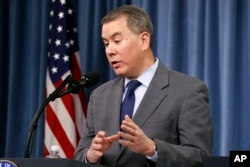Top U.S. defense officials on Wednesday delivered a short but powerful message to Russia, warning that Washington still has the ability to respond no matter what nuclear weapons Moscow has at its disposal.
The comments came during a brief budget hearing before the House Armed Services Committee in response to questions about claims by Russian President Vladimir Putin that his country now has an arsenal of new, “invincible” nuclear weapons.
“We are ready for all the threats that are out there and no one, no one should doubt this,” U.S. Strategic Command chief General John Hyten said.
“There is nothing they can do outside of a massive attack against our country that we would not have the ability to respond,” he added. “By the way, our submarines, they do not know where they are, and they have the ability to decimate their country if we go down that path.”
Putin on Russian capabilities
Just last week, Putin used his annual state of the nation address to boast about Russia’s newest nuclear weapons, including a nuclear-powered cruise missile, a laser weapon, a nuclear-powered underwater drone and a new hypersonic missile.
During the speech, Putin showed a computer-generated video of one of the new weapons destroying Florida. And he bragged that the new weapons would make U.S. missile defense systems “useless.”
“They have not succeeded in holding Russia back,” Putin said, in a reference to the U.S. and its Western allies. “Now they need to take account of a new reality.”
U.S. Defense Undersecretary for Policy John Rood told lawmakers Wednesday that Putin’s comments, “while not surprising, were nonetheless disappointing.”
“We’re concerned about some of the doctrine we see emanating from Russia, talking about early escalation, a greater reliance on nuclear capabilities in a conflict,” Rood said.
Committed to arms control
He also rejected Russian allegations that Moscow was pursuing new nuclear weapons because of Washington’s failure to abide by previous arms control agreements.
“The United States remains committed to our arms control obligations,” Rood said. “Regrettably, the Russian Federation’s track record in terms of its adherence to its arms control obligations leaves a great deal wanting.”
Despite the tough talk, Rood and Hyten shared few details during Wednesday’s hearing, which lasted just over 30 minutes, with many U.S. lawmakers waiting until a closed-door session to ask their questions.
Aware of Russian progress
U.S. officials said previously that the nuclear weapons Putin promoted in his speech last week have been in development for some time, a process that they have monitored closely.
Officials, along with some analysts, have also cast doubt on how close some of the Russian weapons are to actually being operational.
The White House also has noted that, as part of its new $700 billion budget, the U.S. military is actively working to update its own nuclear arsenal and its missile defense systems.
Officials in Washington also point to the proposed fiscal 2019 budget, which calls for another $24 billion specifically to maintain and upgrade the country’s nuclear forces. It also allocates money for new low-yield nuclear warheads and sea-launched cruise missiles, all aimed to deter countries like Russia.
Regional missile defense
There are also plans to improve regional missile defense capabilities, including Patriot anti-missile batteries and the Terminal High Altitude Area Defense systems currently deployed to counter threats from North Korea and Iran.
Additionally, defense officials say the U.S. is working on a new generation of missile defense sensors, lasers and other space-based capabilities to defend against the evolving threat from Russia and China.
But for now, U.S. officials warn the biggest danger stems from countries failing to understand Washington’s capabilities or resolve.
“We have to guard against a miscalculation on behalf of our potential adversaries, particularly Russia and China,” Strategic Command’s Hyten said.
“We can’t allow them to think they can employ a nuclear weapon and the United States will not be able to respond,” he said.






